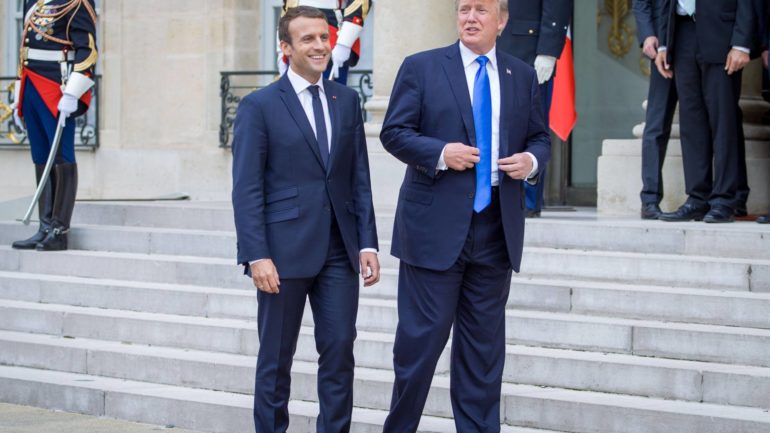Blog

Tomorrow, two years after the adoption of the Paris Agreement, French President Macron will host a special climate summit in Paris to take further action to implement the 2015 deal, notably on climate finance. U.S. President Trump is not invited.
The focus on finance and the absence of President Trump make this a very significant meeting. As Johannes Urpelainen and I recently argued in forthcoming piece for Climate Policy, it is in the area of climate finance that the U.S. withdrawal from the Paris Agreement poses the greatest threat to global climate governance.
Johannes already reflected on the state of climate finance in the wake of the COP23 summit in Bonn, and on the likelihood that other parties such as China will step in and take over the mantle of climate leadership from the U.S.
In this blog post, I wanted to talk about another possible response to U.S. non-cooperation that we raise in our paper: making climate policy more resilient to electoral cycles and shocks.
Populism on the march, climate policy in retreat?
Trump’s election came as a shock and a great surprise to many commentators. Yet, in hindsight, his electoral victory can be seen as part of a broader populist wave across Western countries. The other iconic case is Brexit, the United Kingdom’s vote to leave the European Union.
The rise of right-wing populist parties in the industrialized world and elsewhere raises important domestic barriers for multilateral cooperation in general, and climate cooperation in particular. One of the key tenets of contemporary (right-wing) populism is a profound distrust of experts and elites. Multilateral climate accords such as the Paris Agreement are often portrayed as part of the ‘establishment’ that populist voices are keen to overthrow.
Trump’s rhetoric during the campaign (when he called climate change a ‘hoax’), his cabinet appointments (including appointing climate skeptic Scott Pruitt as head of the Environmental Protection Agency) and his first acts since taking office (notably the dismantling of Obama’s Clean Power Plan) all reflect a strong disbelief in the necessity of climate policy.
Trump does not stand alone with his anti-climate change program. In Germany, the right-wing Alternative for Germany (AfD) seeks to withdraw from all climate agreements including their financial obligations. In France, Le Pen’s National Front party has described the United Nations Framework Convention on Climate Change (UNFCCC) as a ‘communist project’.
These examples call into question the assumption that the world can now count on key industrialized and emerging economies to maintain unanimous support for climate action. The consensus on climate action appears to be restricted to mainstream political parties.
So, how can we make climate policy more resilient to electoral cycles and shocks?
Build green coalitions first, then price carbon
Some people would argue that climate policies can be locked-in through litigation and lawsuits, which are on the rise not just in the U.S. but globally. In constitutional democracies such as the U.S., there are already several legal guardrails in place that prevent a quick dismantling of existing climate policies.
However, the strategy of litigation faces strict limits as its success depends considerably on individual country constituents and legal precedent.
A more promising strategy is to build political constituencies in favor of climate action. This can be achieved through green industrial policies that offer significant benefits to a small group of economic actors, while imposing only moderate costs on society (e.g. renewable fuel standards; feed-in tariffs; subsidies, etc.).
For example, one very important policy that the Trump presidency is not targeting is the federal production tax credit for renewable energy. This tax credit generates direct benefits to many Republican electoral districts, and thus the policy enjoys broad bi-partisan support in Congress.
Economists generally regard such targeted policies that concentrate benefits in a visible way as less efficient than carbon pricing – either through a carbon tax or cap-and-trade, because they tend to have a very high cost per ton of greenhouse gas emissions they abate.
But research in political science suggests that targeted, sector-specific policies bring new economic constituencies into coalitions for decarbonization, while neutralizing opposition from carbon-intensive industries.
Such a favorable constituency is important at a time when climate policy itself could fall prey to electoral populism. Politicians in democratic societies often struggle with the tension between long-term challenges (such as climate change) and short-term election cycles (typically 4-5 years).
A strong domestic pro-climate coalition can ease this tension, and gradually win over public support for carbon-pricing mechanisms.
Think globally, build green coalitions locally
The good news is that many of these green industrial policies to decarbonize energy have been implemented at the state level, along with some carbon pricing schemes, and cannot be dismantled by President Trump.
Buttressing state, municipal, local and community-owned energy projects could further build support and insulate climate policies from electoral cycles.
